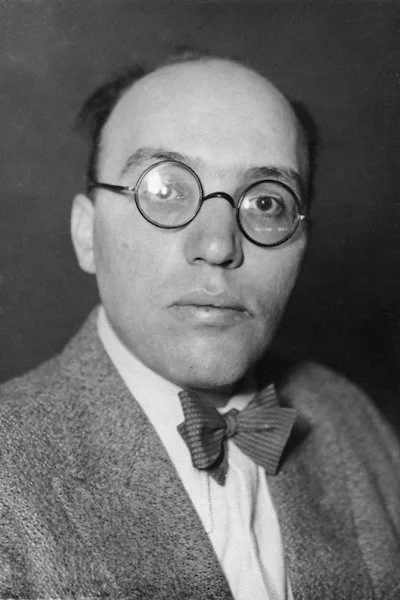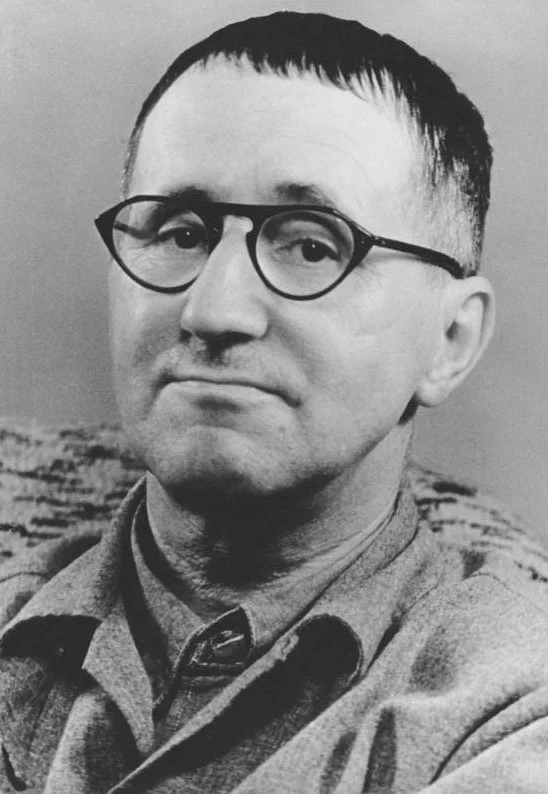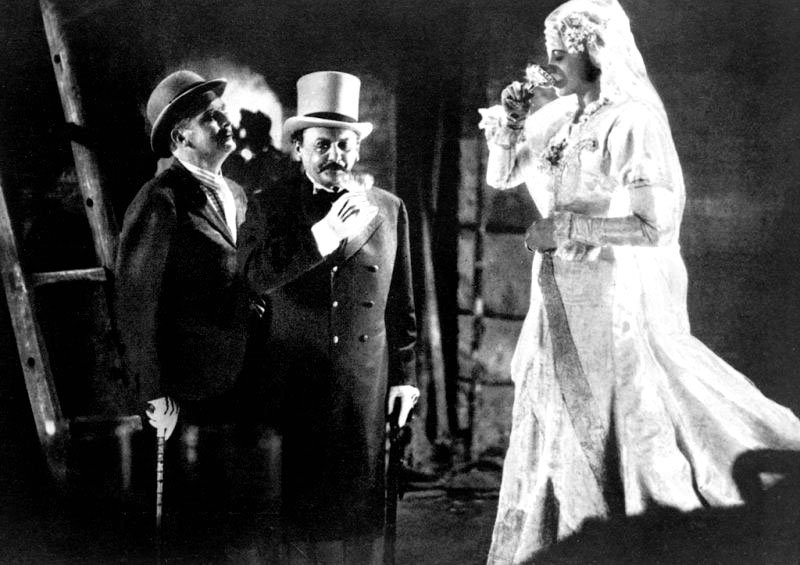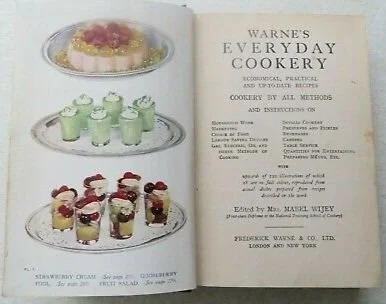Threepenny Opera
Threepenny Opera The Threepenny Opera (Die Dreigroschenoper) is a "play with music" by Bertolt Brecht, adapted from a translation by Elisabeth Hauptmann of John Gay's 18th-century English ballad opera, The Beggar's Opera, and four ballads by François Villon, with music by Kurt Weill.
Kurt Weill (March 2, 1900 – April 3, 1950)
Kurt Julian Weill was a German (later American) composer, active from the 1920s in his native country, and in his later years in the United States. He was a leading composer for the stage who was best known for his fruitful collaborations with Bertolt Brecht. With Brecht, he developed productions such as his best-known work, The Threepenny Opera, which included the ballad "Mack the Knife". Weill held the ideal of writing music that served a socially useful purpose Gebrauchsmusik. He also wrote several works for the concert hall and a number of works on Jewish themes. He became a United States citizen on August 27, 1943. Wikipedia
Bertolt Brecht (10 February 1898 – 14 August 1956)
Eugen Berthold Friedrich Brecht was a German theatre practitioner, playwright, and poet. Coming of age during the Weimar Republic, he had his first successes as a playwright in Munich and moved to Berlin in 1924, where he wrote The Threepenny Opera with Kurt Weill and began a lifelong collaboration with the composer Hanns Eisler. Immersed in Marxist thought during this period, he wrote didactic Lehrstücke and became a leading theoretician of epic theatre (which he later preferred to call "dialectical theatre") and the so-called V-effect.
During the Nazi period, Bertolt Brecht lived in exile, first in Scandinavia, and during World War II in the United States, where he was surveilled by the FBI. After the war, he was subpoenaed by the House Un-American Activities Committee. Returning to East Berlin after the war, he established the theatre company Berliner Ensemble with his wife and long-time collaborator, actress Helene WeigelDuring the Nazi period, Bertolt Brecht lived in exile, first in Scandinavia, and during World War II in the United States, where he was surveilled by the FBI. After the war, he was subpoenaed by the House Un-American Activities Committee. Returning to East Berlin after the war, he established the theatre company Berliner Ensemble with his wife and long-time collaborator, actress Helene Weigel.
Threepenny Opera and Food
The work was based on John Gay’s The Beggar’s Opera (1728), a humorous “ballad opera” with no generic precedent. Gay’s work consisted of dialogue interspersed with 69 songs, mainly popular ballads of the British Isles and France, and well-known opera arias by Handel and Purcell, among others.
John Gay
John Gay: Poet and playwright John Gay was born in Devon to an aristocratic though impoverished family. Unable to afford university, Gay went to London to apprentice as a draper instead. While in London, he began writing journalism. By 1714, Gay had started corresponding with Alexander Pope and become a member of the Scriblerus Club, a group that included Jonathan Swift, John Arbuthnot, Thomas Parnell, and Lord Oxford.
Gay was more or less dependent on patronage his whole life and lived in various semi-employed states with a number of aristocrats. Though relying on the generosity of patrons such as the Duchess of Queensberry, Gay also earned money from his plays, especially The Beggar’s Opera (1728), which enjoyed unprecedented success, running for 62 performances. Allegedly satirizing then-prime minister Sir Robert Walpole, Gay’s play gained notoriety and made staging its sequel, Polly, impossible until 1777. The Beggar’s Opera was in some ways the culmination of Gay’s career. In 1730, he moved to the Queensberry estate in Burlington Gardens, where he spent the last years of his life in partial isolation. He restaged an early effort, The Wife of Bath (1713, revised 1730), and continued writing plays, though he didn’t attempt to get them produced. After his sudden death from fever, he was buried in Westminster Abbey. Pope was a pallbearer and contributed an epitaph to Gay’s memorial. Above it are Gay’s own words: “Life is a jest; and all things show it / I thought so once; but now I know it.”
The wedding scene from the 1931 film of Die Dreigroschenoper
In the 2nd scene of the opera, Matthew, one of Macheath’s (Mack the Knife) cohorts, enters a stable in Soho. He searches the space with a revolver. Once Matthew has confirmed that the stable is empty, Polly enters, wearing a wedding dress. Polly is disappointed that they are going to celebrate their marriage in a stable and even more upset to learn they are going to start their new life together with a crime. She appears not to know Macheath very well. Macheath promises that the furnishings will arrive soon.
The other criminals, Jacob, Robert, Walter, and Ed, enter, delivering carpets, furniture, food, and table settings. They excitedly tell Macheath about all the people that were killed or injured in the acquisition of these goods. However, Macheath is disappointed and tells them that they will never be businessmen. Polly is distraught that people have been hurt just to provide for her wedding. Macheath becomes angry not at the fact that people have been hurt but that the stolen goods do not match. He assumes that is why Polly is upset too and assures her not to worry because the priest will be there soon.
The men set up the stable with their takings and reveal their incompetence in stealing furnishings. The furnishings consist of only two chairs, fourteen forks, two knives, and the legs of a harpsichord, which were sawn off to make a bench. The thieves offer their presents to the couple. Macheath is disappointed with each gift, while Polly thinks they are nice. They all sit down to eat , but before they can dig in, Macheath asks his men to sing something “delightful.” Reverend Kimball arrives, and Macheath calls for a song again. Three of the thieves stand and sing about a couple that marries without really knowing each other at all. Macheath is disgusted and inappropriately calls the song “penurious.”
Polly defuses the situation by offering to sing her own song. She sings “Pirate Jenny,” about a girl who works at a dive bar and is always being teased by the customers about “when her ship will come in.” In the song, the girl patiently does her work and smiles at her dreary circumstances, knowing that one day her pirate husband will pull into the harbor and kill anyone she points at before whisking her away.
Selfridges
Selfridege’s Confectionary Section 1909
Though the opera is set in the year of Queen Victoria’s coronation in 1838, all of the food was stolen from Selfridges Food Hall, which didn’t open until 1909. Brecht often used anachronism to relate his stories to the current day as in Galileo, Mother Courage, or St. Joan of the Stockyards. In 1906, Harry Gordon Selfridge traveled to England on holiday with his wife, Rose. Unimpressed with the quality of existing British retailers, he noticed that the large stores in London had not adopted the latest selling ideas that were being used in the United States. Selfridge decided to invest £400,000 in building his own department store in what was then the unfashionable western end of Oxford Street, by slowly buying up a series of Georgian architecture buildings which were on the desired block defined by the surrounding four streets: Somerset, Wigmore, Orchard and Duke Streets. The store opened in 1909. It contains a famous food hall that sells types of food and drinks. Here is a picture of the Confectioner’s section in 1909 when it opened. As you see shoplifting in the food hall was probably very easy.
There was a bookshop and publisher's (used to promote Selfridge's stock) in the basement. They published cookbooks, one of which was Selfridges Everyday Cookery. Edited by Mrs Mable Wijey Which was a reprint of a book published by Warne, as Warne’s Everyday Cookery
The food in the opera, that Mackie’s gang stole from Selfridges for the wedding on orders from Macheath were plover eggs or eggs mayonnaise. I addition there was evidently some foie gras, but it was eaten by one of the thieves on the way to the warehouse where the wedding was taking place. There is also the mention of trout and salmon being eaten, whiskey being drunk and in the movie there is a picture, above, of Macheath, Polly and Tiger Brown, the chief of police and old friend of Macheath, drinking Champagne out of wine glasses.
Recipes from Warne’s Everyday Cooking also published as Selfridges Everyday Cookery
Eggs with Mayonnaise (Oeufs Mayonnaise)
This dish is basically hardboiled eggs covered with mayonnaise. The cookbook doesn’t exactly have that but it does have individual recipes for both mayonnaise and hard boiled egg. Here the simple plate is garnished with bread and celery leaves
Mayonnaise of Whole Salmon
A whole poached salmon poached in court bouillon, coated with mayonnaise and decorated with cucumber, chilli skins (green pepper), eggs, truffles and cucumber. On a bed of salad.










